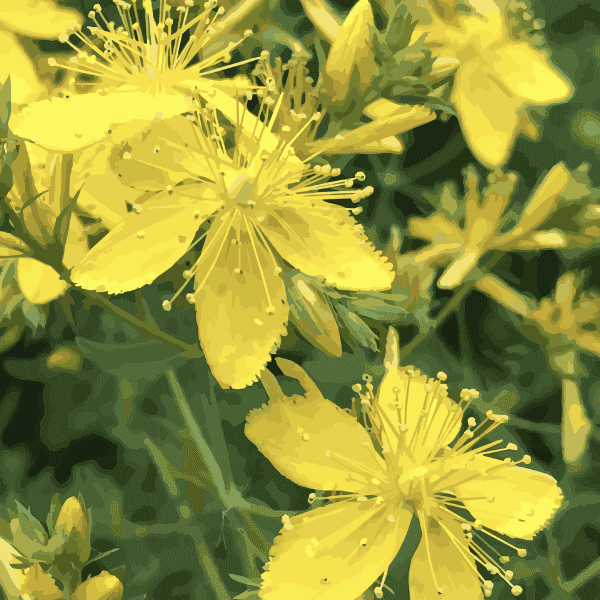
St. John's Wort {Organic}
St. John’s wort is a common weed. Even though many see it as a weed, it has many great benefits. It is best known for its ability to support mental health. It also can soothe achy joints and muscles and has antiviral properties. You will most commonly find it in capsules, powdered, extracts, and tinctures.
You might need St. John’s wort if . . .
St. John’s wort is a common weed, sometimes referred to by its scientific name Hypericum perforatum, and is a part of the Hypericaceae family. St. John’s wort can be identified by its low-growing patches that grow between 1 and 3 feet and tends to grow everywhere. The long leaves have little pin dots and grow opposite each other, over branching stems with bright yellow 5-petal flowers attached. Herbalists often crush the flower bud between their fingers and test for a dark red pigment to release and stain their fingers – the red pigment means the plant has active medicinal constituents.
St. John's wort is a great choice for those who:
- Experience low mood
- Struggle with anxious thoughts
- Are looking for something to soothe discomfort
Benefits of St. John’s Wort
- Antioxidant Properties
- Antibacterial Properties
- Antiviral Properties
- Anti-Inflammatory Properties
- Pain-Relieving Properties
Common Ways to use St. John’s Wort
St. John’s wort can be found in dried bulk, pills, powders, extracts, or tinctures. Growing
Foraging Information
St. John’s wort can be grown in full sun and well-drained soil, it thrives in a variety of climates. If you want to try foraging for it look in sunny fields in late summer. The blooms are bright yellow and have a distinct bitter scent.
Safety Concerns
Mainstream sources have shared a lot of misinformation surrounding St. John’s wort. These sources claim St. John’s wort can cause various side effects and shouldn’t be taken orally for more than 12 weeks. There are claims that St. John’s wort in large doses is possibly unsafe, but of course, no actual dosage information or source. These sources also claim you shouldn’t apply St. John’s wort topically more than once a week, nor for more than four consecutive weeks (again, no data to back this claim).
Drug Interaction: It can interact with many medications, including antidepressants, oral contraceptives, blood thinners, immunosuppressants, and chemotherapy drugs. If you have any health concerns or are taking any prescription medication, please consult with your healthcare provider before adding new herbs to your diet.
Breastfeeding and Pregnancy: Another claim is that St. John’s wort is possibly unsafe when taken by mouth during pregnancy, and they claim it might cause congenital disabilities, but they provide no data to back this. Similar claims are made regarding breastfeeding.
Other Concerns: According to trusted herbalist Richard Whelan, St John’s wort is a safe herb. When used by itself, St. John’s wort has only one real concern; in high doses, it can cause photosensitivity. Richard Whelan cautions that when taking St. John’s wort at medicinal levels, you may need to be aware of sunlight exposure. You don’t need to avoid it; just be careful not to get burnt! Aside from photosensitivity, concerns Richard Whelan discussed are drug interactions
Select Studies about St. John’s Wort
St. John's Wort and Depression: In Depth
St. John’s wort (Hypericum perforatum), a plant that grows in the wild, has been used for centuries for mental health conditions. It’s widely prescribed for depression in Europe.
St. John's wort (Hypericum perforatum) has a history of use as a medicine dating back to ancient Greece, where it was used for a range of illnesses, including various nervous disorders. St. John's wort also has antibacterial, antioxidant, and antiviral properties.